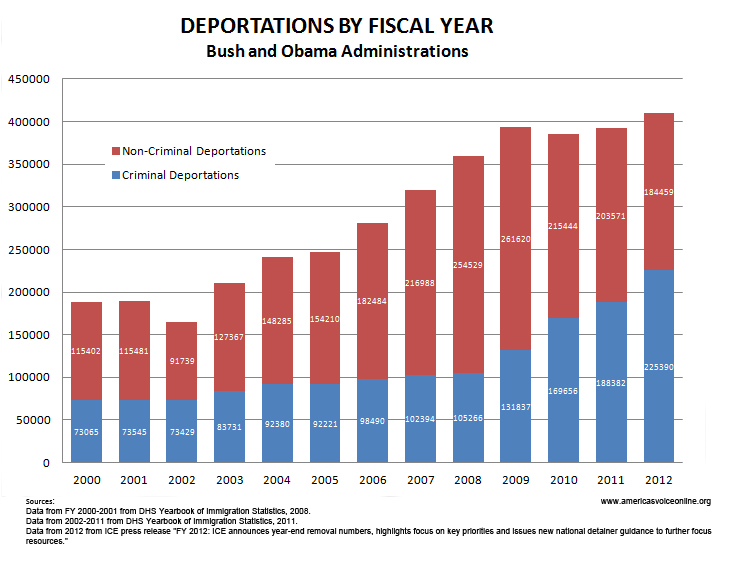Late last Friday, Immigration and Customs Enforcement (ICE) announced that they had deported another record number of immigrants in the last fiscal year, but that they were enacting reforms that could lead to fewer unnecessary deportations in the future. As a New York Times Christmas editorial noted, the policy change “if it works — should lead to smarter enforcement of the immigration laws, with greater effort spent on deporting dangerous felons and less on minor offenders who pose no threat.”
ICE deported 409,949 immigrants in the 2012 fiscal year, up from 396,096 immigrants in FY 2011 and more than 392,000 immigrants in FY 2010.
The record-breaking number of deportations is all the more alarming given that a new prosecutorial discretion policy was first announced a year and a half ago, which promised to focus on criminal deportations and help prevent the separation of immigrant families. And yet deportations continued to rise. As a statement from immigration reform champion Rep. Luis Gutierrez (D-IL) shortly after the ICE announcement explained:
This is nothing to be proud of. In the 409,849 deportations are hardened criminals for whom I have no sympathy, but we must also realize that among these hundreds of thousands of deportations are parents and bread-winners and heads of American families that are assets to American communities and have committed no crimes.
ICE tried to cloak the bad news in some good. The announcement of the deportation numbers came with an ICE policy change that promises to only issue detainers (requests to local law enforcement agencies asking them to hold suspected immigrants in jail until ICE can pick them up) for serious criminal offenders, rather than immigrants with no convictions or only minor transgressions, like a traffic violation. Felons and violent criminals would be streamlined for deportation, while mothers, fathers, and community members could breathe a little bit easier. But it was a testament to the deportation numbers’ potential for damage that ICE saw the need to release them with the policy change—and late on a Friday afternoon just before the holidays.
Last month, Latino voters won a major victory when they turned out in record-breaking numbers of their own to reelect President Obama over Mitt Romney by more than a 3-1 margin. Republicans reeled after the defeat, many publicly admitting that the GOP would have to do better on immigration in the future in order to attract more Latino voters. But the strength of the Latino vote mobilization held a warning for the President and the Democrats as well: that they can’t continue to break deportation records and fail to meet promises of reform.
And so there is a sense of déjà-vu from the newest ICE announcement. The White House knows it must do better to shore up support from its base—and so is trying again to enact a policy it should have implemented last year. (It is also allowing its 287(g) task force agreements to expire at the end of this year, but only because programs like Secure Communities have taken its place.) Ultimately, time will tell whether last week’s announcement marks a turning point —or another failed try, ala last year’s memos. As the New York Times editorial notes:
But wait, you ask, shouldn’t ICE have been doing this all along? Didn’t Mr. Morton say in a memo two years ago that ICE would use its “prosecutorial discretion” to focus on the most dangerous illegal immigrants? He did. But for nearly as long as President Obama has been in office, ICE has been vastly expanding its deportation efforts, enlisting state and local agencies to expel people at a record pace of 400,000 a year — tens of thousands of them noncriminals or minor offenders. By outsourcing “discretion” to local cops through a fingerprinting program called Secure Communities, it has greatly increased the number of small fry caught in an ever-wider national dragnet…
Secure Communities and indiscriminate detainers have caused no end of frustration for many police officials, who rely on trust and cooperation in immigrant communities to do their jobs. They know that crime victims and witnesses will not cooperate if every encounter with the law carries the danger of deportation. They have shied away from a federal role that is not theirs to take.
ICE’s announcement seems to make those efforts unnecessary. It puts the Obama administration on the same page as states and cities that have tried to draw a brighter line between their jobs and the federal government’s. A stricter detainer policy is better for police and sheriffs, who can focus more on public safety. It makes people less vulnerable to pretextual arrests by cops who troll for immigrants with broken taillights. And it helps restore some sanity and proportion to an immigration system that has long been in danger of losing both.


